Beresford Cat Club Of America. Continued
Description
This section is from the book "The Book Of The Cat", by Frances Simpson. Also available from Amazon: The Book Of The Cat.
Beresford Cat Club Of America. Continued
And now a few words on those most excellent institutions which should appeal to the hearts of the animal loving public - I mean the homes for poor stray and starving cats. It is a mercy that there are now several of these refuges in our great metropolis. I have personally visited Gordon Cottage at Argyle Road, Hammersmith, and the London Institution in Camden Town. The objects of both these institutions are practically the same, namely:- (I) To receive and collect homeless and diseased cats and painlessly destroy them.
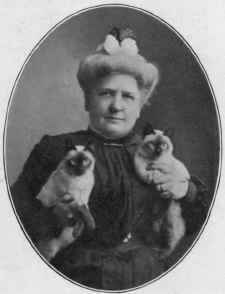
Mrs. Clinton Locke And Her Siamese Kittens "Calif" And "Bangkok. "
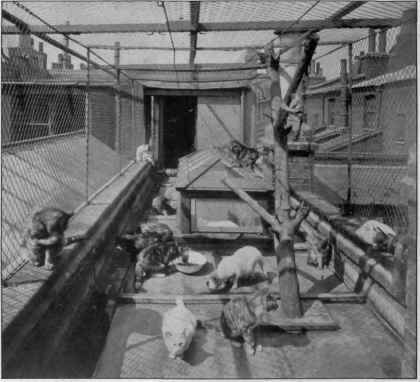
The Cats Playground: Royal London Institution For Starving Cats At Camden Town. (Photo: Cassell & Company. Limited. )
(2) To provide a temporary home for lost cats.
(3) To board cats at a moderate weekly charge.
The Camden Town Institution to which Her Majesty the Queen has graciously given Her Patronage, was founded by Mrs. Morgan in 1896, and up to the end of 1901 has received the enormous number of 47, 212 lost and starving cats. The average received weekly is 300, and in one day as many as 91 cats have been taken in. Not a day passes without several wretched cats having to be destroyed at once on admission, and 80 per cent. are destroyed within twenty-four hours of admittance. No charge is made to the poor, and only 1s. 6d. for a painless death in the lethal chamber is asked from those who can afford this most merciful mode of destroying life. The dead cats are cremated at the Battersea Dogs' Home at a charge of 3d. each body. A motorcar is employed to go round and collect stray cats, and will call at any house if due notice has been given to the hon. manageress. It is estimated that the number of cats in London is close upon three quarters of a million, of which from 80, 000 to 100, 000 are homeless.
It is during the summer months, when householders leave town for their holidays, that poor pussy is forsaken and forgotten, and no provision being made for her, she is forced to take to the streets, where she seeks in vain to stalk the wily London sparrow or pick up any scraps from the gutter. The humbler folk very frequently manifest vastly greater solicitude for the Tom or the Tabby of their hearths than do their social superiors. All lovers of cats owe a debt of gratitude to those truly noble ladies who have begun and carry on such a merciful work in our midst. To attempt to alleviate suffering must appeal to all; and even those who have an instinctive dislike to harmless cats cannot fail to see the immense benefit to be derived by the public at large from the noble endeavour to clear our London streets, squares, parks, and empty houses of these poor forlorn and friendless creatures.
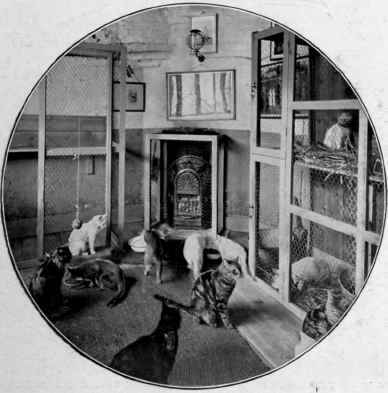
Royal London Institution For Lost And Starving Cats (Photo: Cassell & Company, Limited. )
At the Battersea Home for Lost Dogs there are also splendid arrangements for stray cats, and at a very small charge per week cats can be taken in to board. The catteries are capitally arranged, and the feeding is excellent.
In our sister isle there is a Cats' Home, established sixteen years ago by Miss Swifte in Dublin, and she has most gallantly carried out the beneficent objects with which she started her humane work. No doubt she and other founders of similar institutions have had to suffer a considerable amount of ridicule, for with many human beings the cat is regarded as little deserving of commiseration or kindness. It is, however, a sign of increased justice and benevolence that these homes for cats do exist and obtain public support, although the funds received are, according to all accounts, very inadequate to meet all the expenses. This must surely be partly because these splendid institutions are so little known to the general public.
Our American cousins are not behindhand in their laudable endeavours to cope with the question of lost and starving cats, and an institution similar to our Battersea Home was started in the early 'eighties' in the district of Boston, and is called the "Ellen M. Gifford Sheltering Home for Animals." The lady giving her name to this humane institution left a large sum of money to endow the home, and over the office is a tablet bearing the following extract from one of Miss Gifford's letters about the time the home was opened: -
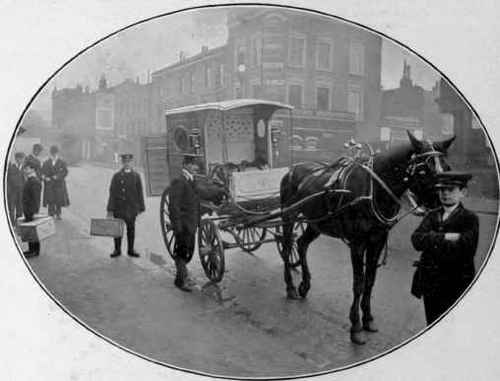
The Cart Of The Royal London Institution For Lost And Starving Cats (Photo: Casselt & Company, Limited. )
"If only the waifs, the strays, the sick, the abused would be sure to get entrance to the home, and anybody could feel at liberty to bring in a starved or ill-treated animal and have it cared for without pay, my object would be attained. March 27, 1884."
According to Miss Helen Winslow, the authoress of "Concerning Cats," there is another institution in Philadelphia which does not limit its good work to tending cats and dogs, but cares for all living and suffering animals, bringing relief to the unfortunate creatures by means of a painless death.
It was as early as 1874 that this institution was founded, and in 1889 it was reorganised and incorporated as the "Morris Refuge for Homeless and Suffering Animals," having for its motto "The Lord is good to all, and His tender mercies are over all His works."
The efforts of the charitable ladies who so ably assisted in the establishment of these institutions have been followed by others, and a proposal to found a home for animals in Montreal has, I believe, proved successful. Miss Winslow tells us that there are several cat asylums and refuges in the Far West, and a Sheltering Home at Brighton, Mass. In 1901 a Cat Refuge was started in Chicago by a well-known cat-lover, Mrs. Leland Norton, and probably, as time goes on, some further organised attempt will be made to deal with the question of lost and starving cats in American towns.
The love of the cat still lingers in Egypt, and I have been told that free rations to starving cats are dealt out every day at the Palace of the Cadi and the Bazar of Khan Kheleel; also that a cats' home has been founded in Cairo for the lodging and feeding of homeless cats.
There was a report that in order to cope with the innumerable lost and starving cats the American Legislature had decided to enforce a bill for licensing cats, but if such a law came into existence in any country the result would surely be that thousands of cats with good homes would be thrust out into the streets, and that rats and mice would multiply to an alarming extent. It is estimated that in New York city alone 60, 000 cats depend for their daily food on garbage and the mice and rats that they capture. Therefore, if each cat catches three mice or rats a week, the sum total amounts to over 9, 000, 000 a year!
I have often wondered why some of our numerous "distressed ladies" do not set up private homes for the care of cats. A really comfortable country home for cats is an enterprise in which many a woman, who is hopelessly at sea for some means of earning an honest livelihood in this overcrowded work-a-day world, might thus combine pleasure with profit. Many fanciers feel the difficulty and well nigh impossibility of leaving their catteries for any length of time, and few have a permanent and responsible caretaker on the premises. An opening, therefore, presents itself not only for boarding homes for cats, but for temporary helps who could be engaged by the week or month to take charge of the cattery during the absence of the owner. Of course, such a person should have had experience with cats and kittens, and above all should be an animal lover. To dwellers in any of our large cities the sojourn in some country place would come as a boon and a blessing, and if the owner of the cattery is fully as-sured of the capabilities of the care -taker, then all anxiety of mind as to the welfare of the pets would be allayed.
There is a secluded corner in Hyde Park known as the Dog's Cemetery, and amongst the many headstones I noticed two or three erected in memory of lost pussies who have been privileged to rest in this quiet burying ground.
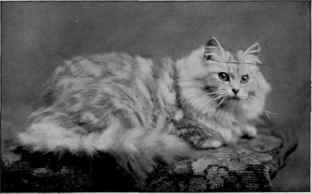
The Hon. Philip Wodehouse's "Silver Saint. " {Photo: Clarke & Co., Norwich. )
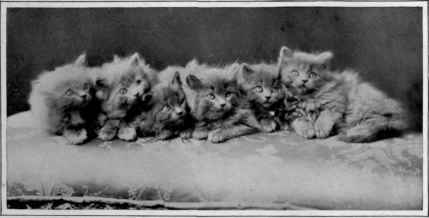
A Bevy Of Blues Belonging To Miss Savery (Photo: Waschenki, St. Leonards-on-Sea. )
When we see poor pussies packed into dirty cages in the shops of dealers of beasts and birds in our great metropolis, and when we are made sad by the sight of the wretched starving cats of our streets, we can breathe no better wish for them than a speedy deliverance from their life of misery, even if it be to embark with the grim ferryman in their free transportation to the Feline-Elysium.
"There shall the worthies of the whiskered race, Elysian mice o'er floors of sapphire chace, 'Midst beds of aromatic marum stray, Or raptur'd rove beside the milky way. "
A French writer of the early part of the eighteenth century, a famous Jesuit Father, suggests a very strange theory on the old idea as to the nature of the soul of animals. I am sure that the question of a future existence for those pets who during so short a time in this world have been our faithful and loving companions must have often entered into the hearts and minds of true animal lovers.
A wise and good man - a writer of some of our most beautiful hymns, and who passed to his rest within the last year - wrote and gave me these lines when he lost his faithful dog: SANCHO: AN OLD FRIEND. A large brown Irish retriever: buried in the Vicarage Garden of St. Paul's, Hagger-ston: a stone to his memory is on the school wall, with this inscription: "In the centre of this lawn lies SANCHO, a gentleman in all but humanity; thorough-bred, single in mind, true of heart; for seventeen years the faithful and affectionate friend of his master, who loved him, and now for him ' faintly trusts the larger Hope ' contained, it may be, in Romans viii. 19-21.
He died April 26, 1883. "
Not sparse of friends the world has been to me By grace of God; sweetness and light to life Their love has given; many a stormy strife, Many a pulseless torpor, on my sea, Through them - their presence or their memory-Have been or stilled or quickened; and to thee, My Dog, the tribute, as the term, is due, My Friend ! not least of all dear, near, and true These seventeen years - and through the years to be Sure in my heart of immortality. Must this be all ? I' the great Day of the Lord, Shall aught that is of good and beauty now Be missing ? Shall not each gift be restored ? Paul says "the whole creation" - why not thou ?
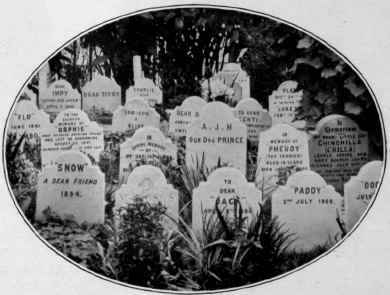
Cats' Tombstones In The Dogs' Cemetery, Hyde Park (Photo: Cassell & Co., Ltd. )
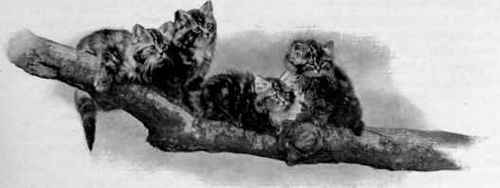
Tabbies Up A Tree - Photo: C. Reid, Wishaw.
Continue to:


